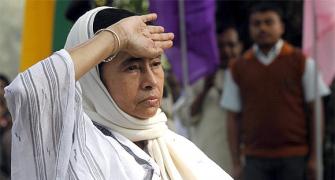 The Congress seems to have brokered peace with the main Opposition parties on the crucial food security and land acquisition Bills and ensured that they are not dependent on the whims and fancies of smaller parties. Renu mittal reports
The Congress seems to have brokered peace with the main Opposition parties on the crucial food security and land acquisition Bills and ensured that they are not dependent on the whims and fancies of smaller parties. Renu mittal reports
Congress President Sonia Gandhi’s two big ticket initiatives -- the Food Security Bill and the Land Acquisition Bill -- are finally going to see the light of day next week in Parliament.
It is being billed as co-operation time between Congress and the Bharatiya Janata Party with the main Opposition party agreeing to support some of the government’s top social sector programmes.
While the food bill comes up before the Lok Sabha on Monday, the land bill -- another key initiative of Sonia -- is slated to come up for discussion on Tuesday with the government agreeing to some of the amendments proposed by the BJP and the Left, clearing the decks for the passage of the bill.
Leader of the Opposition in the Lok Sabha Sushma Swaraj had given an amendment that those farmers who do not want to sell their land should be allowed to lease it. That way they will get money as well as retain land ownership.
In the second amendment, she said that since the land acquisition bill was first introduced in Parliament in 2011, many farmers have sold their land but have not received adequate compensation. So 2011 should be the cut off date and these farmers should be included in the provisions of the bill and get compensation according to the new law when enacted.
The government has accepted both the amendments.
Similarly, the government has also accepted the amendments proposed by the Left, one of which is that while the state-level committees would decide the land prices and compensation, it would be better if the role of the Centre is also there to make it fairer.
Interestingly, the amendment of Trinamool leader Mamta Banerjee has not been accepted, but the government has left a window open by inserting the provision that the state government has the right to make their own laws.
The government is working hard to evolve a broader consensus with the BJP and the Left parties to ensure they are not dependent on the whims and fancies of smaller parties who are often more mercurial and difficult to handle.
While the government is in the process of addressing the concerns of the BJP on the Food Bill, the problems in the Land Bill are being looked into and addressed.
Foreign Minister Salman Khurshid is introducing the land boundary bill between India and Bangladesh and here again the government has engaged the BJP in dialogue to get their support and obviate their misapprehensions.
The government is also trying to work out an acceptable compromise with the BJP on the pension bill.
Sources say that within the BJP also there is increasing concern over its image perception.
With elections just around the corner, they do not want to be seen as opposing key legislation which works to the advantage of the common man or the disadvantaged sections of society.
It is learnt that within the BJP, the opposition to some of these key bills is not as much as is being portrayed outside.
The BJP does not want to be seen as stalling beyond a point or to send the message that they will only agree to welfare schemes if they come to power, otherwise not.
There is instead a view that a more positive image should be the order of the day. Sources say that the BJP does not want to annoy various stake holders who may see them as un-cooperative or obstructionist.
The Land Bill will not only provide security and adequate compensation and fair deals to the farmers who are land owners but also to those who are employed on the land. All those directly or indirectly affected would be taken care of, is the message being sent out by the Congress.
It is yet unknown what has BJP got in quid-pro-quo, if any, for agreeing to co-operate and allowing the government and the Congress to accrue advantage.









